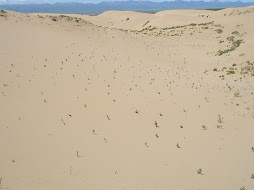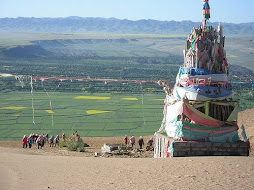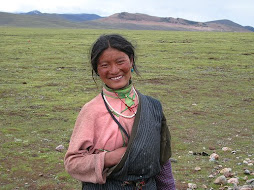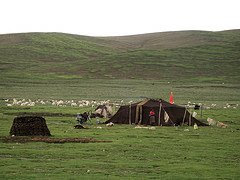I have set up this blog with the hope to raise money to help the people of Lowah village in Amdo province, East Tibet. They live in an area called Mangra and 1000's of peoples livelihoods are effected by the increasing problem of desertification. Amdo is also an area which has maintained a very strong nomadic culture. This way of life is under threat by new Chinese law and if the nomads grasslands are also destroyed by the desertification they will be forced from their land in to Chinese cities. This sadly will help contribute to the death of a proud and unique way of life.Since 2002 Pujah and the villagers have taken it upon themselves to save the grasslands by buying and planting approximately 40,000 trees each year. Financially this is a huge struggle and Pujah is forced to take out bank loans which are a tremendous burden to pay. Sadly the family are often forced to sell their livestock to do so.
Since the 1949 occupation of Tibet up to 50% of its forests have been needlessly destroyed which has led to the desert area of Tibet expanding to 500,000km sq in the past 35 years. 1,000,000 people are dependent on these grasslands for survival as well as numerous species of wildlife and their habitats. This deforestation has led to increased sediment in the rivers and as 10 of Asias major rivers are sourced in Tibet eg Yangtze, Brahmaputra, this causes major environmental problems.Major flooding in the Bay of Bengal has neen attributed to deforestation in Tibet.
The Tibetan people need to be listened to and given power to protect their grasslands, environment and culture. The Chinese Governments plans to resettle chinese people in Tibetan areas has led to over farming and increased desertification as they have no knowledge of the grasslands.
This is why Pujah and his fellow villagers need to be supported and given the power to decide their own fate as Tibetan people. Please sponsor me and Gema on our 800km trek along the El Camino pilgrimage route through the North of Spain so we can raise enough money to help these villagers fight to survive in their own land.
skip to main |
skip to sidebar




made by Gema

This area of sand covers 60,000 acres.Since 2002 nearly 300,000 trees have been planted. But the villagers work is only half completed.One tree costs us only 10p !


20 years ago the sand covered area was just like these lush grasslands in the distance.The villagers need our help to preserve and protect their local environment.

If the land continues to be destroyed by the spread of sand , these nomads will be forced in to cities and towns.

a culture at risk by desertification and Chinese law.

He needs the grasslands to survive !

This is a traditional nomads home, built for all climates.
Trees for Tibet is a grassroots project organised by Pujah and villagers of Lowah in East Tibet. They are battling against desertification and the potential destruction of their grasslands and unique nomadic culture of Amdo. With our help we can raise enough money to help them plant the 40,000 trees they aim to plant each year without the threat of loan repayments.In the second half of 2009 we raised 1200 GBP but more is always needed.All money will go directly to Pujah and the village.
Poem by the XIVth Dalai Lama
In the tree lie the roots
Of all life on earth
When it vanishes
The land exemplified by the name
Of the Jambu tree
Will remain no more
Than a dreary, desolate desert
Of all life on earth
When it vanishes
The land exemplified by the name
Of the Jambu tree
Will remain no more
Than a dreary, desolate desert
Donations
Please send donations to my https://www.paypal-marketing.co.uk/sendmoney/send_to_a_friend.htm account using barleyhill2002@yahoo.ie as my ID.Also I have set up a bank account as many people have said they cant send money via paypal. One can donate through paypal or this bank account.
Barclays Bank
Acc name- Fiona Catherine Sheahan
Acc no - 43936686
sc- 209655
IBAN- GB72 BARC 2096 5543 9366 86
BIC- BARCGB22
I appreciate you taking the time. Thank you very much.
Barclays Bank
Acc name- Fiona Catherine Sheahan
Acc no - 43936686
sc- 209655
IBAN- GB72 BARC 2096 5543 9366 86
BIC- BARCGB22
I appreciate you taking the time. Thank you very much.
Pujah,founder of Trees for Tibet

Planted trees

Trees for Tibet
Since the 1949 occupation of Tibet up to 50% of its forests have been needlessly destroyed which has led to the desert area of Tibet expanding to 500,000km sq in the past 35 years. 1,000,000 people are dependent on these grasslands for survival as well as numerous species of wildlife and their habitats.
This deforestation has led to increased sediment in the rivers and as 10 of Asias major rivers are sourced in Tibet eg Yangtze, Brahmaputra, this causes major environmental problems.Major flooding in the Bay of Bengal has been attributed to deforestation in Tibet.
Trees for Tibet project was set up to raise money to help the people of Lowah village in Amdo province, East Tibet. They live in an area called Mangra and 1000's of peoples livelihoods are effected by the increasing problem of desertification. Amdo is also an area which has maintained a very strong nomadic culture.
This Tibetan way of life is already under threat by new Chinese law restricting freedom of farming and the housing of nomads in towns and cities.If the nomads grasslands are also destroyed by desertification they will be further forced from their land in to Chinese cities. This results in unemployment, drug and alcohol abuse and the death of a proud and unique way of life already struggling to survive.
Since 2002 Pujah and the villagers have taken it upon themselves to save the grasslands by buying and planting Aspen trees each year, approximately 1,000,000 in total.This was aided by free seeds and saplings from the Chinese government at the beginning , as well as some financial support from Germany.But this support has stopped!At the beginning of this project the survival rate of the trees was 70% now it is 95% due to greater knowledge and experience.
Financially this is a huge struggle and Pujah is forced to take out bank loans which are a tremendous burden to pay. Sadly the family are often forced to sell their livestock to do so.£1 will pay for 8 trees, including transport, labour and fencing costs.The local government has given the family permission to plant 26,000mu(17km2 of land).They need to plant approximately 15,200mu(11km2)more ! There is still much work to be done.
The Tibetan people need to be listened to and given power to protect their grasslands, environment and culture. The Chinese Governments plans to resettle chinese people in Tibetan areas has led to over farming and increased desertification as they have no knowledge of the grasslands.
This is why Pujah and his fellow villagers need to be supported and given the power to decide their own fate as Tibetan people. Please help us to continue raising money to help these villagers fight to protect their environment and culture.
This deforestation has led to increased sediment in the rivers and as 10 of Asias major rivers are sourced in Tibet eg Yangtze, Brahmaputra, this causes major environmental problems.Major flooding in the Bay of Bengal has been attributed to deforestation in Tibet.
Trees for Tibet project was set up to raise money to help the people of Lowah village in Amdo province, East Tibet. They live in an area called Mangra and 1000's of peoples livelihoods are effected by the increasing problem of desertification. Amdo is also an area which has maintained a very strong nomadic culture.
This Tibetan way of life is already under threat by new Chinese law restricting freedom of farming and the housing of nomads in towns and cities.If the nomads grasslands are also destroyed by desertification they will be further forced from their land in to Chinese cities. This results in unemployment, drug and alcohol abuse and the death of a proud and unique way of life already struggling to survive.
Since 2002 Pujah and the villagers have taken it upon themselves to save the grasslands by buying and planting Aspen trees each year, approximately 1,000,000 in total.This was aided by free seeds and saplings from the Chinese government at the beginning , as well as some financial support from Germany.But this support has stopped!At the beginning of this project the survival rate of the trees was 70% now it is 95% due to greater knowledge and experience.
Financially this is a huge struggle and Pujah is forced to take out bank loans which are a tremendous burden to pay. Sadly the family are often forced to sell their livestock to do so.£1 will pay for 8 trees, including transport, labour and fencing costs.The local government has given the family permission to plant 26,000mu(17km2 of land).They need to plant approximately 15,200mu(11km2)more ! There is still much work to be done.
The Tibetan people need to be listened to and given power to protect their grasslands, environment and culture. The Chinese Governments plans to resettle chinese people in Tibetan areas has led to over farming and increased desertification as they have no knowledge of the grasslands.
This is why Pujah and his fellow villagers need to be supported and given the power to decide their own fate as Tibetan people. Please help us to continue raising money to help these villagers fight to protect their environment and culture.
Poem by XIV Dalai Lama
In the tree lie the roots
Of all life on earth
When it vanishes
The land exemplified by the name
Of the Jambu tree
Will remain no more
Than a dreary, desolate desert
Of all life on earth
When it vanishes
The land exemplified by the name
Of the Jambu tree
Will remain no more
Than a dreary, desolate desert
About Me

- Trees for Tibet
- London
- My name is Fiona and I have spent alot of time in East Tibet so would now like to give something back.Tibetan people need to be supported and empowered in protecting their own culture and environment,as they struggle to preserve their identity.I know Pujahs family well and they are good, honest people that work very hard to preserve their way of life. They never expect handouts, I would like to help them, with your support. Thank you very much. If you have any queries please contact me at fionasheahan@gmail.com
Reccommended sites
TreesforTibet

made by Gema
Families who are effected by the destruction of the grasslands.

This area of sand covers 60,000 acres.Since 2002 nearly 300,000 trees have been planted. But the villagers work is only half completed.One tree costs us only 10p !
The Grasslands as they should be.

The vansihing Grasslands

20 years ago the sand covered area was just like these lush grasslands in the distance.The villagers need our help to preserve and protect their local environment.
Nomad family

If the land continues to be destroyed by the spread of sand , these nomads will be forced in to cities and towns.
Nomad woman

a culture at risk by desertification and Chinese law.
Yak

He needs the grasslands to survive !
Nomad yak tent

This is a traditional nomads home, built for all climates.